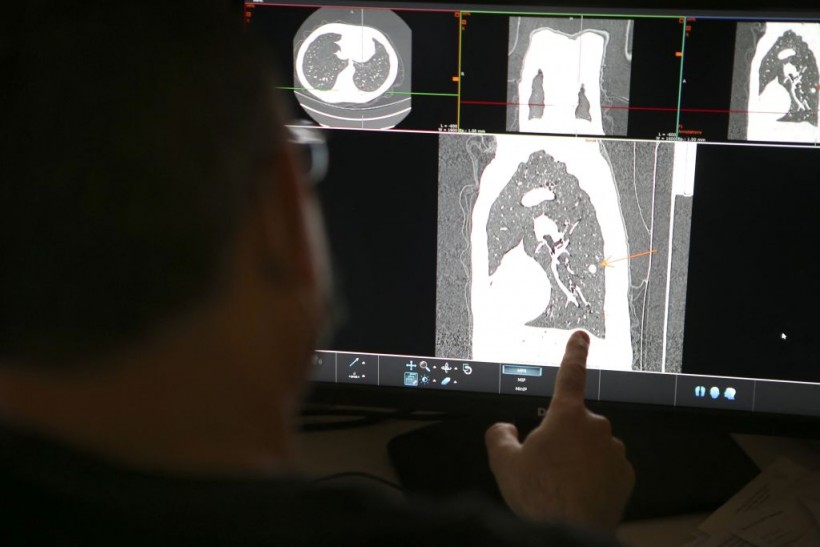A new AI-powered technology was developed in order to assist doctors to predict cancer risks. The model utilizes the data collected from the computerized tomography (CT scan) of lung nodules that appear in the lung organ of a patient.
AI-Powered Tool Predicts Cancer Risk Through Lung Nodule Imaging

Radiologist Fredric Pedulla shows a nodule on a lung scan of a smoking person for the Acapulco experimentation in Ajaccio on December 16, 2021 on the French Mediterranean island of Corsica. - Corsica wants to be at the forefront of lung cancer screening, the leading cause of cancer deaths in France and particularly active on the island, thanks to the launch of a study to detect "early lung lesions" by a low-radiation scanner.
The pulmonary nodules are small lumps that manifest in various spots of the lungs. These spots could be seen frequently in many imaging of the respiratory organ. Most of the details were made possible through the capacity of CT compared to the previous studies that rely on X-ray techniques.
University of Pennsylvania Perelman School of Medicine's Interventional Pulmonology and Thoracic Oncology clinical director Anil Vachani, who served as lead author of the study, explained that nodules commonly appear in five to eight percent of chest X-rays.
Chest CT, on the other hand, is a more sensitive technique, and with the features it offers, small nodules are much clearer in a third to half of the chest imaging, Vachani said.
The new study presents promising solutions that would end an unusual problem that targets 1.6 million individuals in the United States per year, the director continued.
The nodule-detecting model was constructed by developers from England's Optellum Ltd. The machine uses an artificial intelligence algorithm to diagnose a patient accurately and for better assessments of the pulmonary nodules captured by the CT scans.
The AI device could also read the specifications of each nodule, including aspects like their border and size characteristics.
Vachani said that AI could analyze large datasets and create a unique pattern that could not be seen and predicted by human experts, and this information shows the likeliness of malignancy in patients at risk of cancer, EurekAlert reports.
ALSO READ: DeepMind by Google: Will It 'Wipe Out Humanity in the Future?
Cancer Diagnosis More Accurate with Combination of CT Scan and AI Algorithm
The study involved a comparison between diagnosis and malignancy risk of nodules that were collected by six radiologists and six pulmonologists. The examination only relied on the data given by the CT imaging only. The participants also formulated recommendations related to each of the CT findings, including further CT surveillance and diagnostic procedures without utilizing the AI device.
Approximately 300 chest CT images collected from indeterminate pulmonary nodules were analyzed in the experiments. The nodules that the participants considered for the study were the ones that scale between five to 30 millimeters in diameter.
When the chest CT nodule analysis was processed through the AI tool, the authors saw an improvement on detecting the malignancy risk. It also improved the risk stratification and management recommendations given by both groups of specialists.
Vachani said that the readers (participants) were able to curate a reasonable level of accuracy based on the CT imaging alone, but when their clinical interpretation was combined with the AI algorithm, a more stunning level of accuracy can be obtained.
Vachani added that this tool could be utilized in the future regarding how clinical diagnostics judge and differentiate cancer from benign, and hopefully, to improve the experience of patients.
The study was published in the journal Radiology, titled "Artificial Intelligence Tool for Assessment of Indeterminate Pulmonary Nodules Detected with CT."
RELATED ARTICLE: Zoom's AI-Powered Tools Detects User Emotions, But Rights Group Said This Invades Privacy
Check out more news and information on Artificial Intelligence in Science Times.














